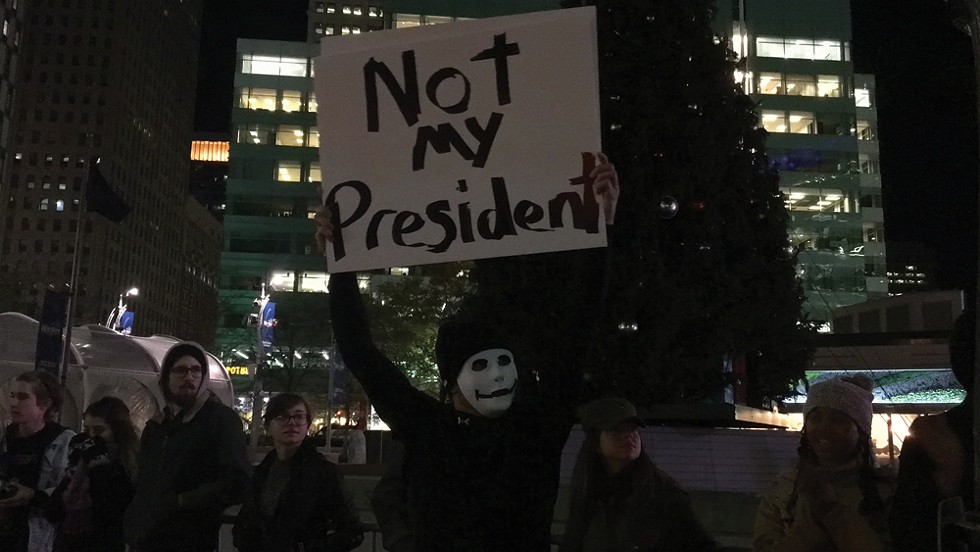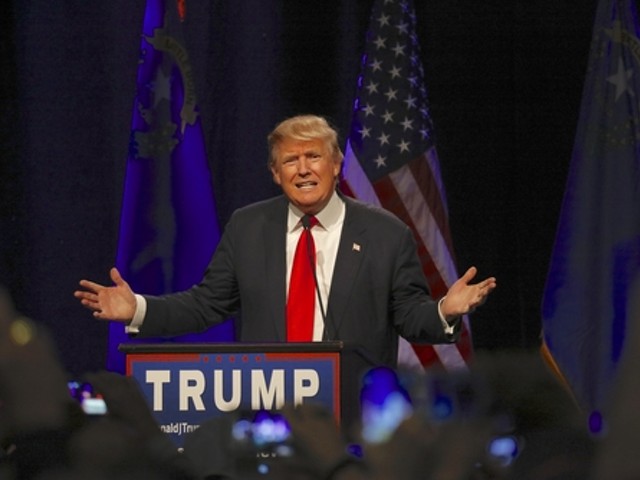This should not have happened.
Either way, the 2016 presidential election was going to be an unprecedented, history-making event. From the Democrats, the first-ever woman candidate for a major party in Hillary Clinton. From the Republicans, an outsider businessman with no political or military experience in Donald Trump.
But that's oversimplifying things, isn't it? To pretend that the 2016 presidential election was an otherwise normal campaign between two historic candidates with slightly different policy ideas is wrong at best and an obvious coping mechanism at worst. The fact is, 2016 was when the system — aka the great American experiment — revealed its fatal flaws.
In a campaign in which the wisdom of the elites was called into question, the Democratic Party shut out rising populist Bernie Sanders and doubled down on its support for Clinton, a smug career politician backed by corporate money and Wall Street.
But even more alarming was the rise of Trump, whose campaign began in June 2015 by calling Mexicans "rapists" and followed a phantasmagoria of increasingly more surreal episodes including, but not limited to, discussing a Muslim registry, attacking the parents of a fallen soldier, boasting about his penis size on national television, saying he could shoot someone and not lose any votes, and a leaked Access Hollywood tape in which he admitted that he liked to grab women "by the pussy." This man is obviously unhinged.
Yet people ate it up. The ratings were yuge. Somehow, even Evangelicals were OK with all of this. And that's the problem. Clinton versus Trump represented the culmination of the culture wars — that vague yet highly effective branding exercise meant to drive us apart by making us feel more different than alike — taken to its logical extreme, with both candidates coming to represent something bigger than themselves. Is it any surprise, then, that both polled among the least-liked in history?
Yet it seems safe to say that nobody expected Trump to win — not even Trump himself. And it's also safe to say that a Trump presidency is not the outcome America wanted. The fact is, Trump's win was only possible through a quirk of the Electoral College: trailing at nearly 2.9 million popular votes behind Clinton, Trump is the biggest popular vote loser in history.
Yet here we are. The pooch has been screwed. We have our president. There's only one way out of this. If you thought the campaign season was long, just wait for the next four years. Here's our step-by-step guide on how to get through them.
— Lee DeVito
Welcome to the resistance
Before offering a word or two about fighting an authoritarian government, I'd like to remind everybody of something really pertinent: In some ways, from the moment it won its freedom, America was always an authoritarian country.
At the very beginning, democracy was limited to white, land-owning men, and was only revolutionary when you consider some people thought America should have a king, not a president. Through the ages, there have been strong, anti-democratic currents of thought and action. Our country has always had Know-Nothings, Ku Kluxers, Black Legionnaires, and John Birchers. Frankly, every country does.
But what has made America a great country is another, concurrent story: Democracy is always being perfected. What makes America different is that we also have our Wobblies, our Freedom Riders, our Yippies, our Black Panthers, our Wall Street Occupiers, and a whole host of other people who fight authority and create space for voices against war, racism, sexism, violence, and environmental degradation.
Don't let the fact that a guy like Trump got elected fool you. When you ask Americans questions without buzzwords and sound bites designed to elicit emotional reactions, their answers skew so far to the left of the contemporary political discourse you'd think the polling company screwed up and called Cuba. Polls have shown again and again that Americans are tired of war, want Canadian-style health insurance, don't want the Trans-Pacific Partnership, loathe the Citizens United ruling, want the minimum wage raised, and are tired of economic inequality.
Trump’s win was only possible through a quirk of the Electoral College: trailing at nearly 2.9 million votes behind Clinton, he's the biggest popular vote loser in history.
tweet this
What's more, the forces of darkness are bound to lose in the end. Demographically, generationally, sociologically, and economically, you simply can't force 325,000,000 people to line up behind programs that represent their collective suicide. You can for a while. Give them a good scare and you might be able to for another four years, but it can't last forever.
On the one hand, you have a federal government that has rapidly grown more authoritarian year after year, a trend going back into the 1990s. That means the disconnect between the state and the nation is greater than ever before. In a way, it's good news: Talk about a situation tailor-made for rabble-rousing! And millennials are going to get their first taste of a president on the order of Bush 2 or Reagan. They're going to have their first experiences with real, live protests, their first opportunities to meet the seasoned people fighting for a better world — even during Democratic administrations.
So now the real learning experience can begin. Leave the vigils, free-speech zones, and Facebook "check-ins" behind, put on your most anti-authoritarian T-shirt, grab some saline solution (to deal with the pepper spray), pull down the visor on your rubber-bulletproof mask, and get out in the streets for a bit of direct action. It's going to be a swinging time.
— Michael Jackman
Get organized
First things first: You are not alone. There are plenty of people who feel mobilized right now. You just need to find them.
A good place to start is Indivisible: A Practical Guide for Resisting the Trump Agenda, compiled by former congressional staffers (indivisibleguide.com). The guide offers tips on how to effectively reach your local elected members of congress and make your voices heard.
Attend town halls. Make coordinated calls. Ask tough questions at photo ops. Demand a sit-in meeting with your representative at a district office.
Another good idea is to donate money to established causes that have been fighting — and will continue to fight — against Trump's agenda. Both Planned Parenthood (plannedparenthood.org) and the American Civil Liberties Union (aclu.org) have seen a surge in donations following the election. Almost immediately, the ACLU launched a campaign featuring a photo of Trump's face with the headline "See you in court."
Can't find a local group? Form your own. Start small. Other groups will become visible to you, and you will become visible to other groups.
Are you a local group organized against Trump? We would like to hear from you. Send us news on protests, demonstrations, and other tips to [email protected].
— Lee DeVito
Speak out against racism and sexism
Not all Trump supporters are a "basket of deplorables," as Clinton famously quipped. But the thing is, the ones who are feel emboldened now, with instances of hate crimes reportedly spiking in the weeks following the election.
Soon, photos of safety pins began circling social media, calling people who see themselves as an ally to minorities to simply wear a safety pin on their shirt to show a sign of solidarity. The trend began after Brexit happened across the Atlantic and quickly began here at home.
While the idea of showing some sort of sign of support for the historically disenfranchised is a nice gesture, in the end a safety pin is not going to help. If wearing a safety pin makes you feel better, then sure, do what you need to do. But you also need to have real conversations with people. We need to call out racism, misogyny, and homophobia whenever we see it.
Trump dismissed his Access Hollywood "pussy" comments as mere "locker room talk." This premise needs to be dismantled. Men should not let other men talk about women this way, even if women aren't around.
But that can seem like an exercise in futility — especially online. I had an uncle (a huge Trump fan) call one of my friends the C-word on Facebook because she called out his sexist comments. I wish I could spend my energy trying to show him how wrong he is, but unfortunately, this man is stuck in his ways. So where do we start then?
I don't believe that every person who voted for Trump is a racist or sexist or homophobic because it's just not true. Are they lacking some empathy? Of course. Can they not see beyond their own privilege? Absolutely. But that doesn't mean that they are not reachable. You can have thoughtful, intelligent conversations with these people and try to find some enlightenment. Much of this needs to happen offline, though.
Point out that Clinton has to apologize for her emails endlessly, but Trump doesn't have to apologize for anything. Point out that "locker room talk" is a terrible excuse for bragging about sexual assault. Hell, you may even have to explain what sexual assault is. Stay calm, cool, and collected. Do your research and bring facts to the table.
Call out people who don't even realize they are being racist or sexist. The other day I was waiting tables at my side job when I overheard one of my co-workers complain about getting a large party of black people. She thought she wasn't going to get a good tip because of a shitty stereotype that sadly exists in the restaurant biz. I calmly pointed out to her that maybe if she didn't go into the situation with an awful attitude, her guests wouldn't feel like she didn't want to wait on them and they would tip her 20 percent.
What about the people who are unashamed of their racist or sexist or homophobic views and opinions? Arguing with them can be like arguing with a brick wall. Calling out their bullshit over the internet isn't really a constructive idea. When you see hatred in a person, react accordingly. Obviously, don't put yourself in harm's way. But sitting back while blatant bullying is going on is not OK. Try to defuse the situation if you can by getting the person away from the bully. Make sure the victim is OK, make sure you're OK, and move on.
It's not going to be an easy four years. We must resist at all costs, but we also need to educate, raise awareness, and enlighten the fuck out of these people.
— Jack Roskopp
Support the press
There's a good chance fake news had a hand in putting Trump in the White House, but at this point that's neither here nor there. The best we can do is educate ourselves, our families, and our friends about what fake news is and how to avoid being seduced by it.
Think back to the pre-internet world and "fake news" concerns were minimal. In those days, newspapers were the gatekeepers of truth and people trusted them as such. These days, things are a little more hazy.
What is fake news? A working definition goes something like this: Fake news is created on hoax websites and is designed to mislead and misinform readers. At best, fake news is created as clickbait (and for websites, clicks equal cash). At worst, it's a psychological tool of warfare. If you need an illustrated example of fake news, just Google "pizzagate."
Now that we have a clear understanding of what fake news is, let's talk about what fake news is not. Fake news is not merely an opinion that you don't agree with. Just because news organizations like the Detroit Free Press, The New York Times, or even Metro Times posts a story that you don't agree with doesn't make it fake news. And if you're a person who likes to make such claims, you should think about a certain orange-faced rich guy who likes to call everyone who disagrees with him a liar — including the press. It's not a good look.
Here's how to combat fake news: Say you post an op-ed from The New York Times and your sister-in-law calls it fake news. Kindly point out that the New York Times is a long-established media organization that employs real journalists who interview and quote real people and those three qualities immediately disqualify them from being fake news.
OK, so what if your sister-in-law posts an article from ABCNews.com.co about the government's involvement with the Sandy Hook hoax and how scripts were given to the media and death certificates were faked, all in order to perpetuate a narrative that Americans need stricter gun control laws?
Here's what you do: Kindly point out that this is a fake news site that has been listed as such on various watchlists (snopes.com's "Field Guide to Fake News Sites and Hoax Purveyors" is a good one) and that you'd gladly read an article about it as long as she can find a legitimate source reporting on the matter. (And consider subscribing to a trusted newspaper, like the Detroit Free Press, The Detroit News, The New York Times, or The Washington Post, which has reportedly seen a surge in subscriptions since Election Day.)
Now, more than ever, a strong press is crucially important in America. In spite of a public that has grown weary and mistrusting of the media, it's all too important that good journalists and news organizations are lifted up — plus, it's the last thing Trump wants.
— Alysa Offman
Your art matters
Of all the responses to the news that Trump will be the 45th president of the United States, the idea that "music will be better now — look how great it was when Nixon and Reagan were in power!" was among the most half-baked, and seriously sad. I mean, would you say that to the face of someone afraid they'll get beaten in the streets now, just because of their religious, sexual, or racial identity?
No, of course not. But hey, we all say dumb shit on social media, and there are many stages of grief when it comes to dealing with President Twitler and his creepy Cabinet of the Undead. The time to grieve is over, and now all creative people must take stock, regroup, and resist.
You matter: First off, no matter what kind of art you make, perform or write, it's important. You do not have to be didactic or overtly political. The arts will always be necessary, and as we will soon see, all art is inherently political. Those in power can find a way to devalue any creative act. The culture wars will first pit manufactured outrage of a few hand-picked "outrageous" artists or professors against the very concept of funding the arts, before going after free speech itself. (Also, please get your personal shit together if you have any prejudices or biases. We all have to work together and the other side is populated entirely by master manipulators of divide and conquer. Also, please stop making shitty vest-folk; that Starbucks soundtrack crap was tired back when Dubya stole his first election.)
Tell your truth: This has always been crucial. But with our gaslighter-in-chief's dominant narrative that no media's to be trusted, and his many friends who excel at propaganda, it's time for us to be as clear-eyed and bullshit-free as possible. As Garry Kasparov tweeted the other week, "The point of modern propaganda isn't only to misinform or push an agenda. It is to exhaust your critical thinking, to annihilate truth." We need to make ours sharp AF. Do not let the bully pulpit of patriotism keep you down, not even during the inevitable wars.
Normalization equals sellout: Resist the urge to cash in, or go along. Don't do a blandly patriotic window display for work — not this year. (If you have to, sneak as many baby hands in as possible.) Collaborators will be accounted for later, assuming we all do not perish in nuclear fallout first. How to fight back now against power-loving toadies? Do not give them a shred of attention. Let's collectively ignore Kanye West, the way we all should have ignored Trump in the first place.
Go underground: Borrow a copy machine and hand-staple your own zine. Wheat paste posters at night. Ignore the curfews. Stay off social media as much as you can; communicate in person, with those you trust. If you must be on Facebook, spread false information about made-up raves across town before you tell friends discreetly about your actual event.
Take even more risks: Go ahead and make music even better, now. Get super, absolutely weird. And go for the jugular every time. Like all bullies and narcissists, Trump has paper-thin skin — use your wit. Be even funnier than Alec Baldwin. This asshole actually loses sleep over gentle parody.
One caveat: writers of speculative fiction and every comedian? You guys are so fucked, sorry. I don't know what to tell you, as the facts so far outpace fiction at this point; you all are on your own.
— Mike McGonigal
Be empatheticNot every Trump voter is racist: states that voted for President Obama in 2012 voted for Trump in 2016.
tweet this
Not every Trump voter is a closet or overt racist. The proof is in the numbers: states that voted for President Barack Obama in 2012 voted for Trump in 2016. The fact that they did so in spite of Trump's general ickiness is disappointing to say the least. But the plain and simple deciding factor that led to Trump's victory was that he tapped into the anxieties and very real frustrations of everyday Americans.
This was especially true in states like Wisconsin, Pennsylvania, and here in Michigan, which turned from blue to red last year. At one point, the Democrats actually sold a hat emblazoned with the words "America Is Already Great." Talk about tone deaf!
America is not great. Trump acknowledged this, and people responded. Wages are stagnant. Good jobs have disappeared. An entire generation has the burden of exorbitant student loans with no way to pay for them. The middle class is eroding, while the 1 percent is getting wealthier. These were the same concerns that drove Sanders' stunning rise (who won Michigan in the primaries — which should have set off alarms in the Clinton campaign).
That Trump has the will or the capability to address these issues in any profound way is the question. Above all else, during the 2016 campaign Trump has revealed himself to be a textbook demagogue. He's a reality TV star who knows how to say whatever he needs to say to get ratings, even if it means contradicting himself.
We know he can talk the talk. We will soon see if he can walk the walk.
It seems likely, though, that many of these Trump voters will feel buyer's remorse — as Trump inevitably breaks his campaign promises, finds new groups to victimize, and proves to be, in the end, just as self-serving, clueless, and petty as he has indicated he is all along.
And that is when we Americans may find that we have more in common with one another than the culture wars have led us to believe.
At least, I hope so.
— Lee DeVito









